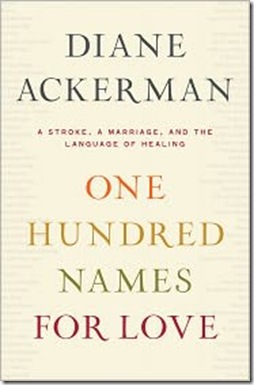 When a blood clot lodges in the brain, patients may lose their ability to speak or write, a devastating setback for anyone, but particularly so for an author.
When a blood clot lodges in the brain, patients may lose their ability to speak or write, a devastating setback for anyone, but particularly so for an author.
Husband-and-wife authors Diane Ackerman and Paul West had devoted their lives to words until that awful day in 2003 when West suffered a stroke that left him devoid of language, an outcome known as aphasia.
One Hundred Names for Love is Ackerman’s affecting account of the long, ongoing recovery process and its crushing impact on their lives.
The book can be read on three levels — a tender love story, a meticulous examination of aphasia, and the latest example of Ackerman’s gorgeous writing.
Ackerman and West met in the early 1970s at Penn State University, where he was a professor and she was a student, 18 years younger than him. They enjoyed parallel literary careers, he as a fiction writer and she as the non-fiction author of widely admired books such as A Natural History of the Senses.
After his stroke West, in effect, became a child again, having lost the ability to speak or perform everyday tasks, such as shaving, combing his hair or brushing his teeth. He couldn’t read, tell time or drink water without choking. His case was particularly severe because he could neither speak nor understand what people said to him. All he could mutter was “mem,” and he would shout “mem, mem, mem” as a curse when no one could figure out his meaning. Ackerman dutifully records the glacial, frustrating process of helping her husband rebuild his vocabulary one word at a time.
She candidly admits to becoming “impatient and resentful” over assuming the roles of teacher, nurse, attendant and caregiver, which cut into her own writing time.
Taking away West’s speech was, in Ackerman’s words, “like emptying his toy chest, rendering him a deadbeat, switching his identity, severing his umbilical cord to loved ones. …”
She describes tender scenes of the couple cuddling in bed and spending evenings making “soulful monkey baby sounds of pure emotion … and laughing at how silly we could still be together, words or no.”
Ackerman summarizes what science knows about how the brain handles speech and memory, as she sets out to learn everything she can about aphasia. She learns that Ralph Waldo Emerson, William Carlos Williams and Samuel Johnson also suffered from aphasia.
Doctors had predicted that West would never write again, and were astonished when, with help, he gradually relearned the alphabet and began writing short stories and even books of fiction, although it became clear he would not regain his full pre-stroke language ability. He still cannot use a computer or typewriter and has trouble reading his own handwriting.
Years after his stroke, “wrong words still veered through his speech like errant comets.” When Ackerman says she does not understand, he repeats a stream of nonsense, knowing what he wants to say, but unable to “harpoon the right words.
The book’s title comes from West’s endearing habit of showering Ackerman with scores of names such as Celestial Elf, My Little Spice Owl, Romantic Little Dew-Sipper.
Several years into her husband’s rehabilitation, Ackerman has learned to live in the moment without worrying about the future. “We unwrap one day a time, treating it as a star-spangled gift,” she writes.
I have two minor reservations about this otherwise memorable book. The descriptions of West’s determined struggle to talk become repetitious, and the book is filled with more science than general readers might want or need.
Yet One Hundred Names for Love should prove inspirational for anyone who has a family member suffering from aphasia, as it demonstrates that even when the prognosis is bleak, remarkable progress is possible by swamping the patient “with language all day long.”
Ackerman ends with a heartfelt reflection on impermanence. “When Paul is gone,” she writes, “the trees and sky will still be beautiful, I will still be poignantly aware of life’s transience, and how lucky I am to be alive on this planet in space. It’s all part of the adventure. I will still cherish being alive, even though I will miss him fiercely. And, oddly enough, I will probably look back on these days as some of the happiest of my life, despite all the worries, frights and impediments, because I loved heartily and felt equally loved in return.”
Bill Williams is a freelance writer in West Hartford, Conn., and a former editorial writer for The Hartford Courant. He is a member of the National Book Critics Circle and can be reached at billwaw@comcast.net.
One Hundred Names for Love: A Stroke, a Marriage, and the Language of Healing, by Diane Ackerman; Norton; 322 pp.; $26.95